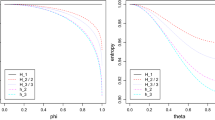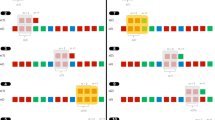Abstract
The weak form of the Efficient Market Hypothesis (EMH) states that current market price reflects fully the information from past prices and rules out prediction based on price data alone. No recent test of time series of stock returns rejects this weak-form hypothesis. This research offers another test of the weak form of the EHM that leads to different conclusions for some time series.The stochastic complexity of a time series is a measure of the number of bits needed to represent and reproduce the information in the time series. In an efficient market, compression of the time series is not possible, because there are no patterns and the stochastic complexity is high. In this research, Rissanen's context tree algorithm is used to identify recurring patterns in the data, and use them for compression. The weak form of the EMH is tested for 13 international stock indices and for all the stocks that comprise the Tel-Aviv 25 index (TA25), using sliding windows of 50, 75, and 100 consecutive daily returns. Statistically significant compression is detected in ten of the international stock index series. In the aggregate, 60% to 84% of the TA25 stocks tested demonstrate compressibility beyond randomness. This indicates potential market inefficiency.
Similar content being viewed by others
References
Alon-Brimer, Y. (2002). Measuring the efficiency of the Israeli stock market by the context tree model. M.A. dissertation (in Hebrew), School of Management, Ben-Gurion University, Israel.
Chen, S.-H. and Tan, C.-W. (1999). Estimating the complexity function of financial time series: an estimation based on predictive stochastic complexity. Proc. of the 5th Int. Conference of the Society for Computational Economics, Boston, June 24–26.
Chen, S.-H. and Tan, C.-W. (1996). Measuring randomness by Rissanen's stochastic complexity: applications to the financial data. In D.L. Dowe, K.B. Korb and J.J. Oliver (eds.), Information, Statistics and Induction in Science, World Scientific, Singapore.
Fama, E.F. (1991). Efficient capital markets: II. Journal of Finance, 46, 1575–1611.
Feder, M., Merhav, N. and Gutman, M. (1992). Universal prediction of individual sequences. IEEE Transactions on Information Theory, 38(4), 1258–1270.
Hellstrom, T. and Holmstrom, K. (1998). Predicting the stock market. Technical Report Ima-TOM-1997-07, Umea University, Sweden. Available on the web.
Merhav, N. and Feder, M. (1998). Universal prediction. Invited Paper, Special Commemorative issue of the IEEE Transactions on Information Theory, celebrating 50 years of Information Theory, IT-44, pp. 2124–2147.
Rissanen, J. (1983). A universal data compression system. IEEE Transactions on Information Theory, 29(5), 656–664.
Rissanen, J. (1989). Stochastic Complexity in Statistical Inquiry. World Scientific, Singapore.
Weinberger, M., Rissanen, J. and Feder, M. (1995). A universal finite memory source. IEEE Transactions on Information Theory, 41(3), 643–653.
Willems, F.M.J., Shtarkov, Y.M. and Tjalkens, T.J. (1995). The context-tree weighting method: Basic properties. IEEE Trans. on Information Theory, 41(3), 653–664.
Willems, F.M.J., Shtarkov, Y.M. and Tjalkens, T.J. (1997). Reflections on the prize paper ‘The context-tree weighting method: Basic properties’. In Newsletters of the IEEE.
Ziv, J. (2001). A universal prediction lemma and applications to universal data compression and prediction. IEEE Transactions on Information Theory, 47(4), 1528–1532.
Author information
Authors and Affiliations
Rights and permissions
About this article
Cite this article
Shmilovici, A., Alon-Brimer, Y. & Hauser, S. Using a Stochastic Complexity Measure to Check the Efficient Market Hypothesis. Computational Economics 22, 273–284 (2003). https://doi.org/10.1023/A:1026198216929
Issue Date:
DOI: https://doi.org/10.1023/A:1026198216929




